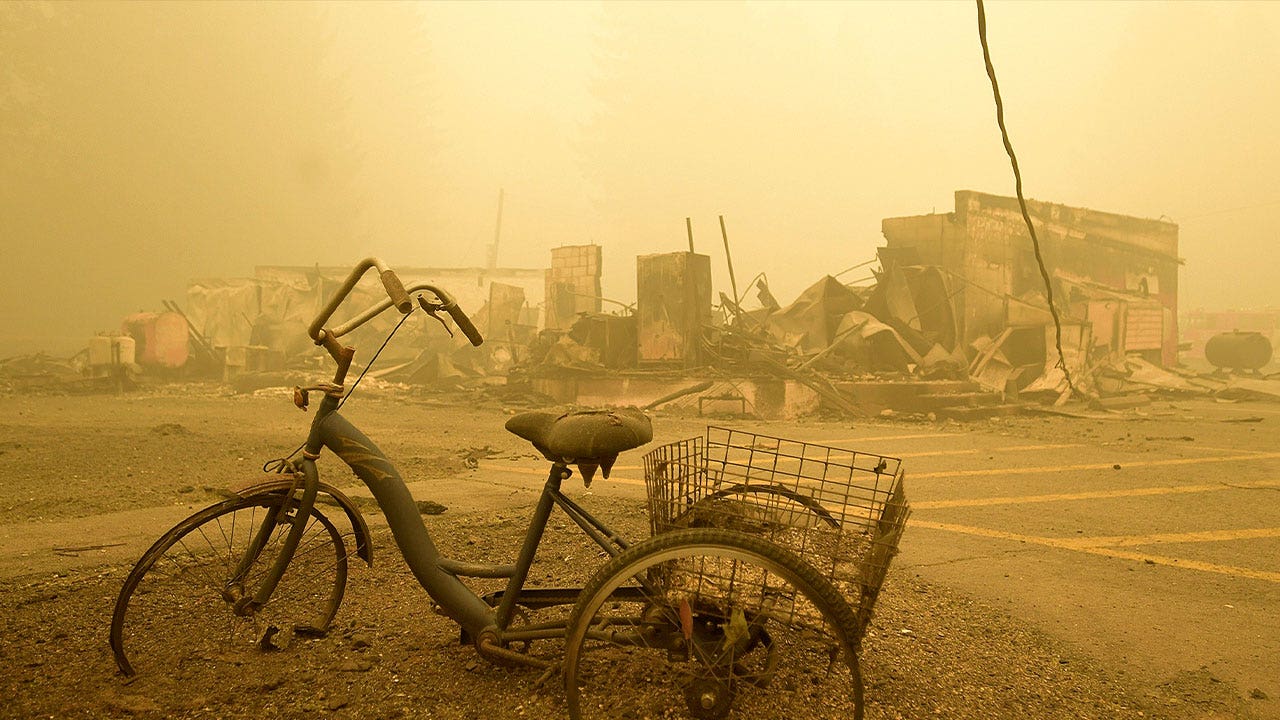Global Courant 2023-04-26 18:36:49
A lawsuit related to a $1.6 billion class action lawsuit against utility company PacifiCorp over Oregon’s catastrophic Labor Day 2020 wildfires began Tuesday in Portland.
The 2020 fires killed nine people, burned more than 1,875 square miles in Oregon and destroyed more than 5,000 homes and buildings.
PacifiCorp is the primary defendant in lawsuits arising from the fires, The Oregonian/OregonLive reported.
WILD FIRE IN NEBRASKA BURNS THROUGH 650 ACRES OF LAND ALONG THE MISSOURI RIVER
The Portland-based utility, Oregon’s second largest, did not cut power to its 600,000 customers during the storm. The lines have been involved in multiple fires, one of which started in the California service area and burned in Oregon.
Jurors in the Multnomah County trial will determine PacifiCorp’s responsibility, if any, in four of those fires: the Santiam Canyon fires east of Salem; the Echo Mountain Complex near Lincoln City; the South Obenchain fire near Eagle Point; and the Two Four Two fire near the southwestern Oregon town of Chiloquin.
The lawsuit, regardless of the outcome, is likely to change the way Oregon’s electric utilities respond to increasing wildfire risks amid climate change, persistent drought and a spike in the average number of acres burned each year.
Nicholas Rosinia, an attorney for the plaintiffs, asked jurors to hold PacifiCorp responsible for failing to cut power on Labor Day 2020.
A bicycle stands near the burned remains of a building destroyed by a wildfire near the Lake Detroit Market in Detroit, Oregon, on Sept. 11, 2020. (Mark Ylen/Albany Democrat-Herald via AP, File)
“These fires were predictable and preventable and destroyed the lives of thousands of Oregon residents,” Rosinia told jurors. “They had the knowledge, they understood, and they chose to do nothing.”
Doug Dixon, an attorney representing PacifiCorp, disputed that the utility’s pipes caused three of the four fires and most of the resulting damage. He told jurors that PacifiCorp was on high alert and acted similarly to most other utilities that did not proactively shut down power.
“This case is about reasonable precautions PacifiCorp is taking to provide safe, reasonably priced power,” he said. “PacifiCorp has and will continue to take its role very seriously.”
Rosinia told jurors Tuesday that prior to Labor Day, PacifiCorp had been repeatedly warned by state regulators for deficient tree pruning and vegetation management around power lines. fire danger had come from the National Weather Service days before the fires, as well as a dire warning from the utility’s own contract meteorologist, he said.
Hours before the storm moved southward into Oregon, fires started in PacifiCorp’s Washington state service area, which was also ample warning of what was to come, Rosinia said.
NEW MEXICO GOVERNOR SIGNS LEGISLATION TO BAN PRESCRIBED BURNS AS FOREST MANAGEMENT IN RESPONSE TO 2022 DISASTER
At one point, Rosinia told jurors, a power cut was the utility’s only option to prevent ignitions. But he said PacifiCorp never seriously considered it, even when employees at its Portland headquarters received reports of fires under power lines across the state.
Dixon said in his opening statements that prosecutors were trying to pin the blame on PacifiCorp with an overly simplified, hindsighted version of what happened — without context about the realities of climate change and the role forest management plays in causing and preventing wildfires.
Far from unprepared, PacifiCorp was the first in the Pacific Northwest to develop a wildfire plan, he told jurors. PacifiCorp was the first utility to identify areas of high wildfire risk in its service area and roll out a plan for public safety-related power outages in those areas. It also increased spending on tree pruning in the two years before the fire, he said.
“No utility (in Oregon) had ever initiated a public safety outage before September 2020. It really is a last resort” that carries its own risks to public safety, he told jurors. “A public safety shutdown is like a sledgehammer,” when utilities really need a scalpel, he said.
CLICK HERE TO GET THE FOX NEWS APP
Dixon said PacifiCorp employees were on high alert, but his own forecasts showed relatively favorable winds in his service area. He said only two utilities proactively shut down or turned off power after the storm caused a blackout in the Santiam Canyon.
PacifiCorp plans to contest whether the power lines and the fires they set in Santiam Canyon caused property damage to most of the plaintiffs in the class action lawsuit. It blamed that damage on a lightning-caused fire miles away that was whipped into a great conflagration amid Labor Day winds. Dixon acknowledged that power lines did cause one fire. But he said the company will show there was no way it could have spread beyond a very limited area.
The lawsuit will determine PacifiCorp’s liability and any actual property damage for 17 named plaintiffs, each also seeking $3 million in non-economic damages for emotional distress and suffering. The liability finding, if any, would then apply to a larger group of about 2,400 people who had property damaged by the fires.
The process is expected to take at least six weeks.








